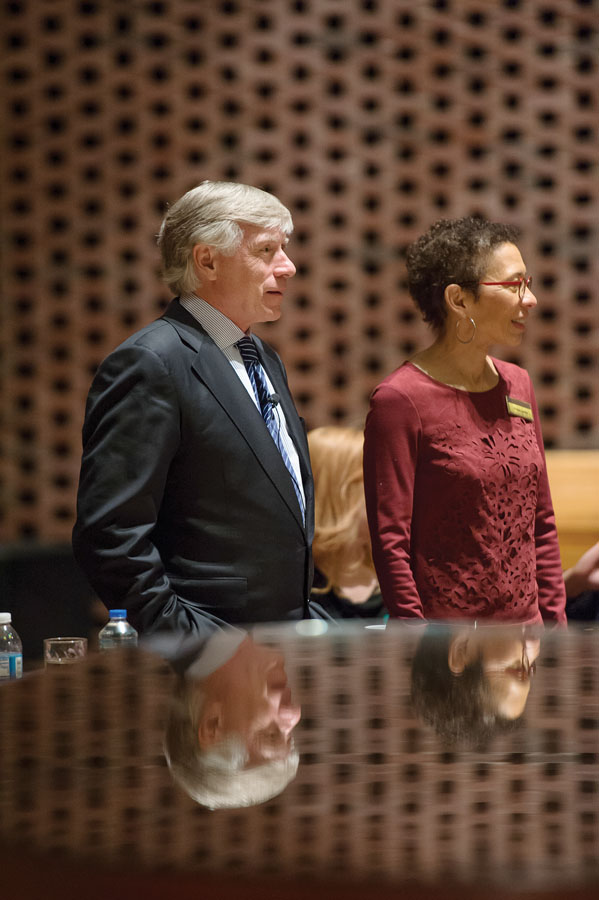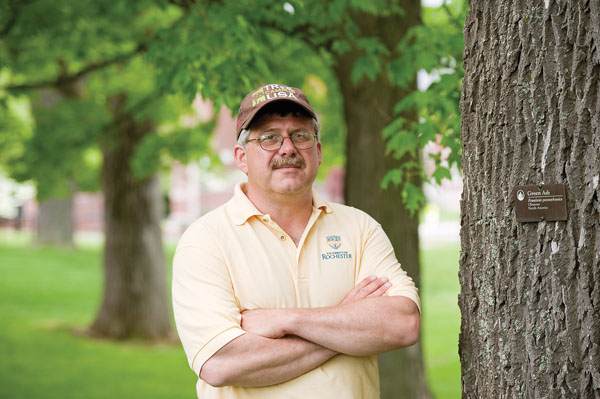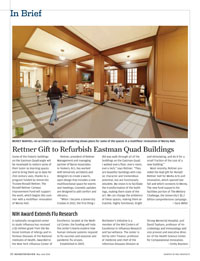In Brief
 MOREY MARVEL: An architect’s conceptual rendering shows plans for some of the spaces in a multifloor renovation of Morey Hall. (Photo: Courtesy of HOLT Architects)
MOREY MARVEL: An architect’s conceptual rendering shows plans for some of the spaces in a multifloor renovation of Morey Hall. (Photo: Courtesy of HOLT Architects)Some of the historic buildings on the Eastman Quadrangle will be revamped to restore some of their luster as learning spaces and to bring them up to date for 21st-century uses, thanks to a program funded by University Trustee Ronald Rettner. The Ronald Rettner Campus Improvement Fund will support the work, which begins this summer with a multifloor renovation of Morey Hall.
Rettner, president of Rettner Management and managing partner of Baron Associates in Yonkers, N.Y., has worked with University architects and designers to create a warm, open design that includes a new multifunctional space for events and meetings. Cosmetic updates are designed to add comfort and vibrancy.
“When I became a University trustee in 2012, the first thing I did was walk through all of the buildings on the Eastman Quad. I walked every floor, every room, every inch,” says Rettner. “They are beautiful buildings with classic character and tremendous potential, but are functionally obsolete. My vision is to facilitate the transformation of the buildings, making them state of the art. We can change the ambience of these spaces, making them attractive, highly functional, bright and stimulating, and do it for a small fraction of the cost of a new building.”
Most recently, Rettner provided the lead gift for Ronald Rettner Hall for Media Arts and Innovation, which opened last fall and which connects to Morey. The new fund supports the facilities portion of The Meliora Challenge, the University’s $1.2 billion comprehensive campaign.
—Sara Miller
NIH Award Extends Flu Research
A nationally recognized center to study influenza has received a $3 million grant from the National Institute of Allergy and Infectious Diseases of the National Institutes of Health. Awarded to the New York Influenza Center of Excellence, located at the Medical Center, the funding will help the center’s teams explore how human immune systems respond to flu vaccines and seasonal and pandemic flu viruses.
Established in 2007, Rochester’s initiative is a member of the NIH Centers of Excellence in Influenza Research and Surveillance. The center is led by John Treanor, professor of medicine and chief of the Infectious Diseases Division at Strong Memorial Hospital, and David Topham, professor of microbiology and immunology and vice provost and executive director of the Health Science Center for Computational Innovation.
—Emily Boynton
Diversity Leader Urges ‘New Civil Rights Movement’
 SPEAKER: Columbia University President Lee Bollinger (left) was the guest for a conference organized by Vice Provost Vivian
Lewis. (Photo: Adam Fenster)
SPEAKER: Columbia University President Lee Bollinger (left) was the guest for a conference organized by Vice Provost Vivian
Lewis. (Photo: Adam Fenster)One of the nation’s leaders in addressing diversity in academia urged a campus audience to continue to fight for inclusion. “Race still matters in America. Our system is unjust to this day. We have not fixed the problems Brown [v. Board of Education] identified,”
said Lee Bollinger, the president of Columbia University, who played a leading role in the two Supreme Court cases that upheld and clarified the importance of diversity as a justification for affirmative action in higher education. The civil rights movement “is not over,” he said. “Indeed, it needs a whole fresh start.”
The March conference, Crossroads: An Opportunity for Progress, brought together more than 400 administrators, trustees, faculty, staff, alumni, and community members to explore race, power, and definitions of diversity in the University community.
Vivian Lewis, vice provost for faculty development and diversity and deputy to the president, organized the conference, which included 18 workshops in three conference tracks: race in our community, power and empowerment, and redefining diversity.
Led by Jean Carroll, president and CEO of the YWCA, and leaders of the Facing Race, Embracing Equity initiative, community workshops explored racial, ethnic, and cultural histories, and how racial disparities influence members of the Rochester community.
Two workshops engaged participants in creating new definitions of diversity, while Rush Rhees Library hosted opportunities for personal conversations with individuals from diverse groups.
—Melissa Greco Lopes
 TREE KEEPERS: Dan Schied and his grounds crews help maintain more than 1,400 trees of 116 different species on the River Campus. (Photo: Adam Fenster)
TREE KEEPERS: Dan Schied and his grounds crews help maintain more than 1,400 trees of 116 different species on the River Campus. (Photo: Adam Fenster)As Lovely as a Tree . . .
For the fourth year in a row, the Arbor Day Foundation has named Rochester to its Tree Campus USA program, a national effort to honor colleges and universities with a commitment to effective urban forest management and to engage staff and students in conservation goals.
The program recognized the work of the University’s horticulture and grounds department to meet the program’s five standards, which include maintaining a tree advisory committee, a campus tree-care plan, dedicated annual expenditures toward trees, an Arbor Day observance, and student service-learning projects.
Dan Schied, manager of horticulture and grounds, says there are more than 1,400 trees of 116 different species within the mowed areas of the River Campus. To view a River Campus Tree Tour video, as well as additional resources on the University’s arboretum, visit www.facilities.rochester.edu/arboretum.
—Sara Miller
Political Science Fellowship Endowed
Doctoral students in political science have a new fellowship program to support their research and scholarship, thanks to a gift from Douglas ’80 (PhD) and Constance Beck.
Douglas Beck, the senior vice president of ICF International—a publicly traded global consulting firm—credits his successful career in government and business to his Rochester education, which included receiving a fellowship for his own research in political science as a graduate student during the 1970s
The gift supports The Meliora Challenge, the University’s $1.2 billion fundraising initiative. —
Susan Hagen

